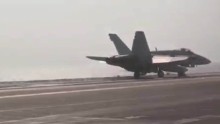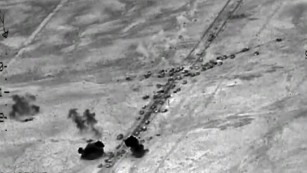Airstrike kills 2 ISIS commanders, U.S. says
Two ISIS senior military commanders died last week in a U.S. airstrike, killing a man that the United States says oversaw the terror group's 2014 offensive to capture the all-important Iraqi city of Mosul, the Pentagon said Friday.
The June 25 airstrike near Mosul killed ISIS' deputy minister of war, Basim Muhammad Ahmad Sultan al-Bajari, and Hatim Talib al-Hamduni, a military commander in the area, Pentagon spokesman Peter Cook said.
Bajari oversaw ISIS' efforts to capture Mosul in June 2014, Cook said.
"These deaths are the latest in coalition efforts to systemically eliminate ISIL's cabinet wherever they hide, disrupting their ability to plot external terror attacks and hold onto the territory they use to claim legitimacy. The international coalition fighting ISIL, working with local, capable, and motivated forces on the ground in Iraq and Syria, continues to make sustained progress in our campaign to deal ISIL a lasting defeat," Cook said in a news release, using another name for ISIS.
"Al-Bajari was an experienced terrorist, a former member of al Qaeda who brought his military skills into ISIL's terrorist network. He oversaw ISIL's June 2014 offensive to capture Mosul, and has also led the ISIL Jaysh al-Dabiq battalion known for using vehicle-borne IEDs, suicide bombers and mustard gas in its attacks. He used his military experience to consolidate ISIL's control over Mosul, where they have engaged in dictatorial rule and sectarian murder and oppression since 2014. Hatim Talib al-Hamduni was an ISIL military commander in Mosul and the head of military police for self-proclaimed Ninawa state."
The strike comes days after a major triumph for Iraq -- its forces announced the liberation of Falluja after weeks of fighting.
ISIS convoys fleeing Falluja hit by airstrikes, U.S. officials say
Now, Iraq and Kurdish fighters turn their attention toward wresting control of the northern metropolis from the terror network. Iraq plans to undertake its offensive sometime this year, taking back towns and villages surrounding the city and then taking Mosul back from the terror network. Mosul is the second-largest city in Iraq and its liberation is a priority for the forces battling ISIS.
Despite its purported involvement in the Istanbul and Dhaka terror attacks this week, ISIS appears to be on the defensive across its Middle East -- from its self-declared capital of Raqqa in Syria to Falluja, just 65 kilometers (40 miles) from the capital, Baghdad.
While no one has claimed responsibility for the airport assault, analysts believe ISIS was involved. ISIS claimed responsibility for the Dhaka terror attack, according to Amaq, an ISIS media branch, but some officials cast doubt on the claim.
On the defensive
Earlier this week, the fight against the Sunni-dominated ISIS was buoyed when Iraqi troops seized Falluja in sprawling Anbar province -- a Sunni swath of Iraq. The city was liberated Sunday after the military recaptured the last neighborhood.
Iraqi forces killed more than 1,800 ISIS militants during the operations to recapture the city and villages surrounding it, said Lt. Gen. Abdul Wahab al-Saadi, commander of the liberation of the city.
CNN cannot independently verify all fighting in every area of Falluja has ended. But in a symbolic victory, Iraqi police raised the national flag over the mayor's office.
Iraqi seizure of Falluja came nearly four weeks after the start of a U.S.-backed offensive.
Fierce fighting has taken place street by street, and bombs remain a concern as ISIS fighters flee the city.
Many houses are booby-trapped, forcing Iraqi forces to move slowly and methodically to clear improvised explosive devices.
Despite the recapture, aid groups stressed that safety is still a concern and urged displaced families not to return home.
Days later, coalition airstrikes pounded two ISIS convoys leaving Falluja over two days, destroying about 175 vehicles carrying militants out of the city, the spokesman for the U.S. coalition said Thursday. Col. Chris Garver said Iraqi security forces destroyed other vehicles.
Cook said Friday that the coalition fighting ISIS is making "sustained progress."
"The coalition has freed Falluja from ISIL's grip; launched devastating strikes against ISIL forces fleeing that city; completed the encirclement of Manbij, a key node in the flow of foreign fighters between Syria and Turkey; and started to clear key terrain south of Mosul of ISIL forces. In addition to making operationally significant strides in our campaign to defeat ISIL, we continue to look for - and seize - every opportunity to hasten it," Cook said.
Months in the making
The operation to liberate Mosul has been months in the making and involves coordination between Iraq's military, Kurdish forces and the international coalition.
Kurdish Peshmerga troops have been involved in working to regain villages near the city. In late May, a Peshmerga-led ground offensive, backed by international coalition air support, was launched to retake several villages.
Kurdish media outlet Rudaw reported that the Peshmerga troops, accompanied by Zeravani Special Forces -- a Kurdish paramilitary outfit -- picked their way across ISIS-held territory, retaking abandoned villages it says were once populated by Kurds.
"I am very happy to help liberate these villages today, because they are Kurds like us," 1st Lt. Hemin Rashid, a Zeravani Peshmerga fighter from Halabja, told the media outlet.
News Courtesy: www.cnn.com












